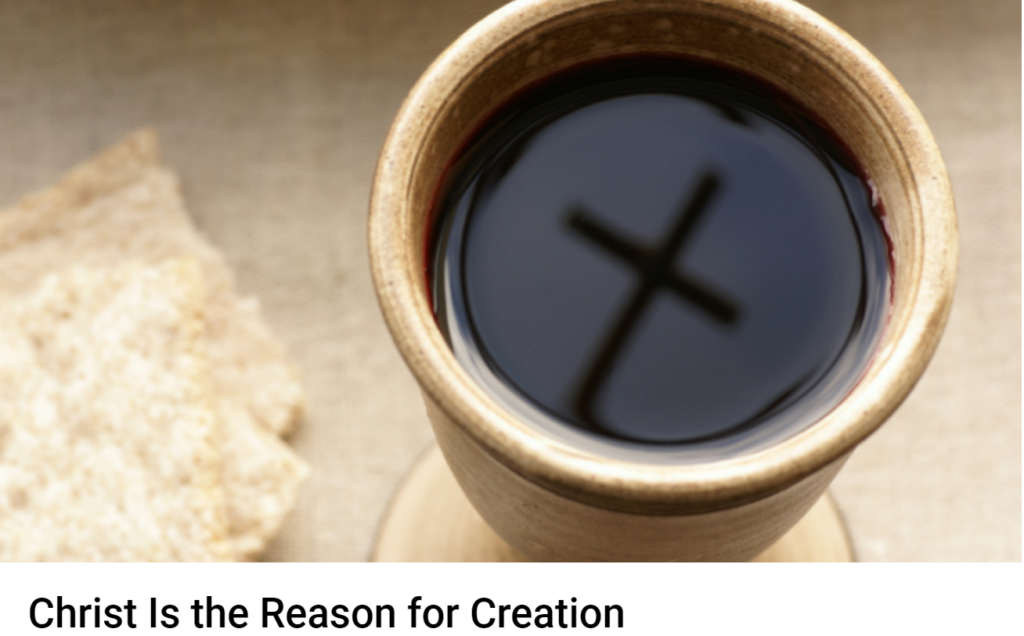
Daily Reflection – We Become What We Love


416 N 2nd St, Albemarle, NC, 28001 | (704) 982-2910


The Franciscan tradition maintains that Christ is the primary lover of the infinite love of God—the whole reason for creation is Christ. Jesus, we might say, is the “big bang” of the human potential for God because in his unique person, he realized the created capacity for God. As the Christ, the Anointed One of God, Jesus is God-with-us, the human One who mediates our relationship with God for all eternity. What happened in Jesus, however, must take place in all humanity (and creation) in order for the fullness of Christ to be realized, that is, in order for transformation of all created reality in God to be fulfilled. We might say that Jesus is the Christ but Christ is more than Jesus because Christ is all of humanity and creation as we are intended to be in the risen One, Jesus the Word incarnate, who is our permanent openness to the mystery of God’s infinite love.
— from the book The Humility of God: A Franciscan Perspective, by Ilia Delio, OSF
//Franciscan Media//


The fullness of the mystery of Christ is completed in humanity; thus, it depends on us human beings and our participation in the mystery of Christ. Because the non-human material world depends on us humans for its completion in God, it, too, is part of the mystery of Christ but can only participate in this mystery in and through the human person. How does this relationship between Christ and humanity relate to the humility of God? Well, if God bends over in love for us in and through the Word incarnate, then we who are little “words” must bend over in love for one another and for all creation if the universe is to find its fulfillment in Christ. God’s humble love must live in us through grace and freedom.
— from the book The Humility of God: A Franciscan Perspective by Ilia Delio, OSF

“Let us recognize with lively faith and with the help of the Holy Ghost the great evil of sin, which robs us of grace. Then we shall immediately detest it with all the power of our soul and banish it from our heart. We shall detest it because, in depriving us of grace, it deprives us of the highest good and of the possession of God and make us worthy of the most severe punishment from His hands. We shall detest it still more because by sin we commit the greatest wrong and the greatest offense against the Author of Grace. For after we have been called through grace to be children of God, we offend Him not merely as our Supreme Lord and Master, to whom we owe unlimited service and respect, but as our most loving Father, our best Friend, the most tender Spouse of our soul. We despise the ineffable love with which He embraces us and return the basest ingratitude for His inestimable gifts and blessings. We disgrace Him and insult His name by dishonoring the name of His children and by showing ourselves unworthy of Him. We tear loose from His bosom the soul that He loved as the apple of His eye and considered as the jewel and joy of His heart. We rend the heavenly robe of innocence and sanctity with which He had clothed us and presented us to the whole Heaven. Like Judas, we desert Our Lord and Saviour, who by grace has numbered us among His friends and loved ones. What pain we inflict on the tender heart of our heavenly Father, how deeply we offend and wound it!”—Fr.Matthias J. Scheeben, p. 345
//Catholic Company//

“Truth sees God, and wisdom contemplates God, and from these two comes a third, a holy and wonderful delight in God, who is love.”
— St. Juliana of Norwich
//Catholic Company//

Jesus was free because he was rooted in the love of God and, therefore, humble. Ultimately, Jesus was free enough to offer his life as a sacrifice for the sake of God’s truth. Humbly rooted in love, Jesus was free to die on a cross. And in that freedom, God’s freedom of love was revealed, the love that brings about a new future. The cross signifies to us that if we are free enough to love then we are free enough to die, and if we are free to die then we are free to live. As long as we are in relation to a God who is freedom-in-love, then death will be part of our journey. For every distance of separation from God must be overcome by death, by giving up isolated existence for a greater union. Finite human life longs for fulfillment of relationship, for union, and only death can remove the veil that separates us from the infinite love of God. Yes, freedom is the gift of love but love prevails in freedom. Violence, suffering and death do not have the last word in God. The last word is love.
— from the book The Humility of God: A Franciscan Perspective by Ilia Delio, OSF
//Franciscan Media//


//Catholic Company//

I’m Sorry. . . So Sorry!
Father Peter Fitzgibbons
September 4 – 5, 2021
Gospel: Mark 7: 31-37
In the Gospel, our Lord healed the deaf man. Why? Read the story. . .He was asked. A lot of us do not ask for miracles. Why does Jesus do miracles? Well, for a couple of reasons. First, it is very revelatory. It reveals a number of things about God. But, let’s put that aside for a moment. Did the deaf man ask for a miracle? No, he couldn’t. His friends did through intercessory prayer, and that’s very important. Also, did our Lord say to the man and his friends, “I’d really like to help, but have you given to the DSA?” “Have you given very good stuff to the yard sale?” “How are your Sunday collections going?” “Are you helping out at the church?” “Have you brought Father food?” Good food…no cucumbers! No. He didn’t interrogate them. Our Lord restored the man’s hearing and his speech because He loved him. Our Lord never refused a miracle to anyone who asked or to anyone who didn’t ask. He knew that the woman would touch His garment, and He used that as an example.
Miracles are expressions of who and what our Lord is. He gives us favors and miracles because He loves us. They are gifts of His love. They are meant to draw our hearts to Him and to sustain us in being. Scripture tells us that our Lord lets the rain fall on the just and unjust. It revealed to the people of Israel who our Lord was. Our Lord is God. He can heal our infirmities. Do I have my physical limitations? Oh, heck yeah! My mind writes checks that my body cannot cash. I’m 68, and I still think I’m 18. Saint Paul said that if you ask for prayers of healing, sometimes it will happen and sometimes it won’t. But, the Lord told Saint Paul, “My grace is sufficient for you, for my power is made perfect in weakness.” God does miracles all the time over at Atrium Health. When people undergo bypass surgery, the healing is very slow. First, they get the surgery, then they wake up, and then they go to therapy. Everything moves at a slow pace, but they are our Lord’s miracles.
Miracles reveal God’s nature. Do you know what God’s nature is? God’s nature is love itself. Jesus was love incarnate. He came to give the gift of His love which is Himself. There are a number of miracles recorded in the Gospel, and there are more that are not as Saint John tells us at the end of his gospel. The Lord gives us these gifts to show His love and His awareness of our needs. What does God want in return? Our love. That is what gifts of love are. They are given freely. Our Lord gives us these gifts of love to help turn our hearts toward Him and away from ourselves.
Keep praying for His gifts. Sometimes He says “No.” However, when He says “no,” He gives us the grace to handle His answer and to bear whatever difficulties it brings. I will tell you that it doesn’t seem that way. I’m still not a Monsignor after 38 years, and I’m not happy about it. But I’m humble, and I can handle it. Our good Lord gives us the gift of Himself which is the greatest miracle of all. His miracles are not just for physical ailments. The greatest miracle is not the gift that someone gives you, it’s the gift of themselves. The physical aspects of the gift are signs of an invisible reality. As Catholics, we see the greatest gift of all here in church. . .the gift of Christ Himself in Holy Communion and the Sacrament of Penance. He gives it freely because He wants our love. He loves us so much that He allows Himself to be handled by an evil and sinful man such as myself. God gives us these gifts not because we deserve them. You cannot earn love. He gives these gifts because He loves us. He created us out of love. He gives us these gifts of love to draw us away from ourselves and back to Him. So, keep praying for miracles.
Father’s Afterthoughts:
I have been blessed with family and friends who point out my faults. Do I have my faults? “No, Father.” Yes, I do, but thank you for that. God gives me the grace to carry my crosses. One of the great graces that God gives us for carrying our crosses and our faults is humility. He gives us the humility to go back to someone and say you screwed up and ask for forgiveness. Even I make mistakes on occasion, and when I do, I ask for forgiveness. That’s how we show God’s love. You’d be surprised when you say to someone, “I’m sorry.” It is like the old Brenda Lee song, “I’m Sorry…So Sorry.” Say “I’m sorry” to someone, and they may say, “Whatever.” There’s a big difference between saying “I’m sorry” and “forgive me.” Have you ever heard a song with “forgive me” in the lyrics? Saying “forgive me” shows God’s power working in you.
How will you apply this message to your life? Are you praying for His gifts?
Email [email protected] if you would like sermon notes emailed to you. Also, you can read all of Father Fitzgibbons’ sermons by going to annunciationcatholicalbemarle.com/ and clicking on “Blog” then “Categories” and then “Sermon Notes.